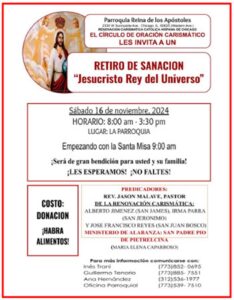Join the Men’s Club for the following upcoming events:
- Open Gym – Queen of Angels Open Gym for families to be held Saturday October 26 from 6-8pm at the gym and the adjoining Mission Hall.
- Bags Knight – 4th Annual Bags Knight will be held Friday, November 15, 2024 in Mission Hall and the gym starting at 6pm. All skill levels are welcome! Players 7th grade and up are invited to participate in the tournament. No babysitters needed, families welcome! We will have open gym for the kids and a “Littlest Knights” area for our youngest guests. Please RSVP to Joe Wyss wyss.joe@gmail.com or Leroyd Manuel lmanuel81@gmail.com.
- Men’s Club Meeting – Men’s Club meets the second Thursday of each month at the Queen of Apostles Parish Center, 4412 N Western Avenue, in Mission Hall at 8:00 p.m.
- Queen of Apostles Parish Golf Outing – Returning next summer on July 26, 2025. More information to come.
Únase al Club masculino para los siguientes eventos:
- Gimnasio Abierto – Queen of Angels Gimnasio abierto para familias se llevará a cabo el sábado 26 de octubre a partir de las 6-8 p.m. en el gimnasio y el Salón de la Misión contiguo.
- Bags Knight – La 4ª edición anual de Bags Knight se llevará a cabo el viernes 15 de noviembre de 2024 en Mission Hall y en el gimnasio a partir de las 6 p.m. ¡Todos los niveles de habilidad son bienvenidos! Los jugadores de 7º grado en adelante están invitados a participar en el torneo. No se necesitan niñeras, ¡las familias son bienvenidas! Tendremos un gimnasio abierto para los niños y un área de “Littlest Knights” para nuestros huéspedes más pequeños. Por favor, confirme su asistencia a Joe Wyss wyss.joe@gmail.com o Leroyd Manuel lmanuel81@gmail.com.
- Reunión del Club de Hombres – El Club de Hombres se reúne el segundo jueves de cada mes en el Centro Parroquial, 4412 N Western Avenue, Sala de Misiones a las 8 p.m.
- La excursión de golf de la parroquia de Reina de los Apóstoles – Volverá el próximo verano el 26 de julio de 2025. Más información por venir.

